(完整版)高考英语改错常见考点大剖析及经典习题
高考英语短文改错题专题讲解及练习(含答案)
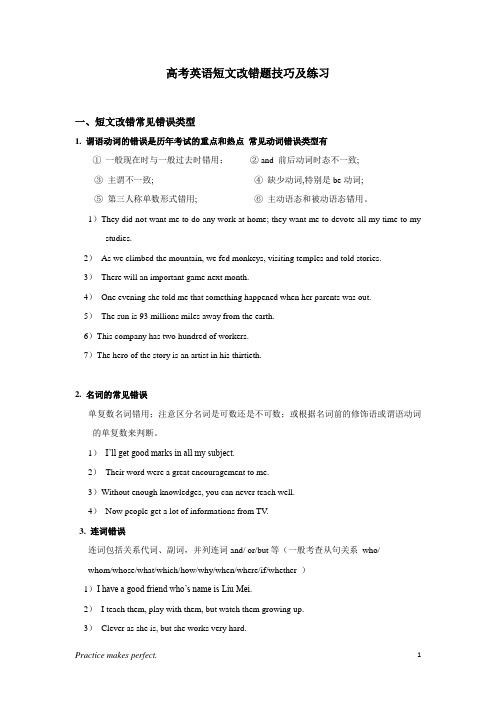
多余的冠词或则少冠词。
1)We may be one family and live under a same roof.
2)As everyone knows, it’s famous mountain with all kinds of pan
3)It is so beautiful place that you must visit it.
4)Now people get a lot of informations from TV.
3.连词错误
连词包括关系代词、副词,并列连词and/ or/but等(一般考查从句关系who/
whom/whose/what/which/how/why/when/where/if/whether)
1)I have a good friend who’s name is Liu Mei.
高考英语短文改错题技巧及练习
一、短文改错常见错误类型
1.谓语动词的错误是历年考试的重点和热点常见动词错误类型有
①一般现在时与一般过去时错用;② and前后动词时态不一致;
③主谓不一致; ④缺少动词,特别是be动词;
⑤第三人称单数形式错用;⑥主动语态和被动语态错用。
1)They did not want me to do any work at home; they want me to devote all my time to my studies.
单复数名词错用;注意区分名词是可数还是不可数;或根据名词前的修饰语或谓语动词的单复数来判断。
1)I’ll get good marks in all my subject.
2)Their word were a great encouragement to me.
(整理版高中英语)高考英语短文改错考点解析名词

高考英语短文改错考点解析-名词一、考点规律分析短文改错的名词考点主要涉及名词的单复数问题,即在该用复数的地方误用其单数,或在该用单数的地方误用其复数。
二、真题单句归纳〔1〕 We stopped to rest for a while and to drink some waters from a stream. 〔waters 改为water,因“水〞为物质名词,不可数〕〔全国卷〕〔2〕 We climb everywhere, not only in America. We have been to Europe many time. 〔time改为 times,many times 意为“许屡次〞〕〔全国卷〕〔3〕 There are branch library in many villages. 〔library 改为 libraries,因其前的谓语are为复数〕〔全国卷〕〔4〕 I hope that you two could come and visit us some times soon. 〔times 改为 time,some time 意为“某时〞〕〔全国卷〕〔5〕 Today I visited the Smiths — my first time visit to an American family. 〔去掉time,因first 已含有“次〞的意思〕〔全国卷〕〔6〕 They were eager to know everything about China and asked me lots of question. 〔question 改为 questions,因其前有表示复数意义的修饰语 lots of〕〔全国卷〕〔7〕 We study quite a few subject, such as maths, Chinese, English and physics. 〔subject 改为 subjects,因 a few 后应接复数可数名词〕〔全国卷〕〔8〕…and often watch football match on TV together. 〔match 改为 matches〕〔全国卷〕〔9〕 Happy birthday, Peter, and many happy return of the day!〔return改为 returns,many happy returns of the day!为祝贺生日的惯用表达〕〔春季卷〕〔10〕 She said that she and my schoolmate all wished me success. 〔schoolmate 改为 schoolmates,因校友不只一个,另外根据其后的 all 也可推知〕〔全国卷〕〔11〕 I used to love science class — all of them— biology, chemistry,geography, physics. 〔class 改为 classes,指其后提到的所有课程〕〔春季卷〕〔12〕 They did not want me to do any work at family. 〔family 改为 home,因at home 为固定短语〕〔全国卷〕〔13〕…so that I‘ll get good marks in all my subject. 〔subject 改为 subjects,请注意前面的 all〕〔全国卷〕〔14〕 On the way up I was busy taking picture since the scenery was so beautiful. 〔picture 改为 pictures,picture 作为可数名词,其前应有限定词,或为复数形式〕〔全国卷〕〔15〕 No one worries much about the radio program young people listen to. 〔program 改为 programs,从句意上看,此处应用复数〕〔春季卷〕〔16〕 Their word were a great encouragement to me. 〔word 改为 words,注意其后的复数动词〕〔全国卷〕〔17〕 You know,that was a dinner we had waited for several month.“〔month 改为 months,因 several 后要用可数名词的复数形式〕〔卷〕〔18〕…but after class we become stranger at once.〔stranger改为strangers,由本行前面的we可知应该用名词复数〕〔全国卷〕〔19〕 You can find all kinds of information in just a few minute on the Internet. 〔minute改为minutes,因为a few后面的名词一定是复数〕〔卷〕〔20〕Nowadays millions of people of all age take pleasure in a hobby…〔age 改为ages,因谈到不止一个人的年龄,age用复数;of all ages指各个年龄阶段的人〔卷〕〔21〕She was doing her homeworks one Sunday morning when… 〔homeworks改为homework,因它是不可数名词,没有复数形式〕〔卷〕〔22〕 Without enough knowledges, you can never teach well. 〔knowledges 改为knowledge,因 knowledge是不可数名词,没有复数形式〕〔卷〕三、模拟单句演练〔1〕 Women live longer than men in most country.〔2〕 The film is very interesting. I have seen it many time.〔3〕It‘s said that all the ticket have been sold out.〔4〕 The children spend a lot of times watching TV.〔5〕 I met a lot of interesting peoples on holiday.〔6〕 The flower in the park were all pleasing.〔7〕 As the day went by, she became less anxious.〔8〕 Computer are becoming more and more popular in the country.〔9〕It‘s one of the most interesting book that I’ve ever read.〔10〕 He made his first time visit to China when he was 18.〔11〕 Hearing the news, the woman burst into tear.〔12〕He hasn‘t lived here long, but he has a great many friend here.〔13〕 I was afraid she would have left for family when I got there.〔14〕He‘s getting married next month and decides to buy some furniture s.〔15〕There‘s a paper’s factory near our school.「参考答案」〔1〕 country 改为 countries,因其前的most 意为“大多数〞。
(完整版)高考英语改错常见考点大剖析及经典习题

高考英语改错常见考点大剖析及经典习题㈠高考短文改错命题焦点:短文改错是全国统一高考中一种综合性很强的试题.短文改错的文章多采用记叙文,有时也用说明文。
在100词左右的短文中设有十个小题,该题的设计形式有四种:1.该行错一个词,找出来并改正.2.该行多一个词,找出来并去掉。
3.该行缺一个词,补上一词。
4.该行没错,不改动.从近几年的高考题来看,这四种形式的考查情况大致为:多一词1~2处;缺一词1~2处;正确1处;错一词5~6处。
这种题说到底是考查用词、词的搭配、词法、句法及语篇中的行文逻辑等各方面的水平.换句话说,这是一种比较全面的考查。
我们在平时的学习中就要注意做到词不离句,句不离篇,要特别注意词的用法、搭配和语法分析能力的培养。
平时打好这种基础,就为正确地解题准备了条件.㈡短文改错解题技巧:⒈快速阅读掌握大意.短文改错时应先从头到尾快速读一遍,了解其大意,这样有助于了解其中的逻辑关系,对时态、人称等都心中有数。
十行中一般有九行有错误,一行无错,如发现并纠正错误,首要的任务是对全段文字有个整体的理解,阅读中注意句子的时态、语态、语气、非谓语动词或动词短语,注意句子中的名词、数词,以及其他词性的语法要求,注意句子之间的逻辑关系,注意段落的主旨内容,注意整篇短文的中心内容,这样才更加有效地完成改错.⒉在改错过程中,要结合上下文语境来观察,不要只盯住一行。
按照上述的原则,对语法、句法、逻辑词义、搭配等诸方面进行综合考查分析并改正错误,应看上下文中有无逻辑关系上的错误,有无语法修饰上的错误,有无惯用法方面的错误.如果没有发现明显错误,则分别检查时态、人称,单复数,主谓一致等各项.⒊检查句与句之间的逻辑关系是否恰当。
如有不妥之处,看看是否关联词有问题.⒋整篇做完后,认真检查一遍,注意其中逻辑关系是否合理,时态人称等是否一致.㈢短文改错常见考点:⒈多一词:抽象名词前多一冠词:如:Modern people know more about the health。
2019高考英语改错常见考点大剖析及经典习.doc
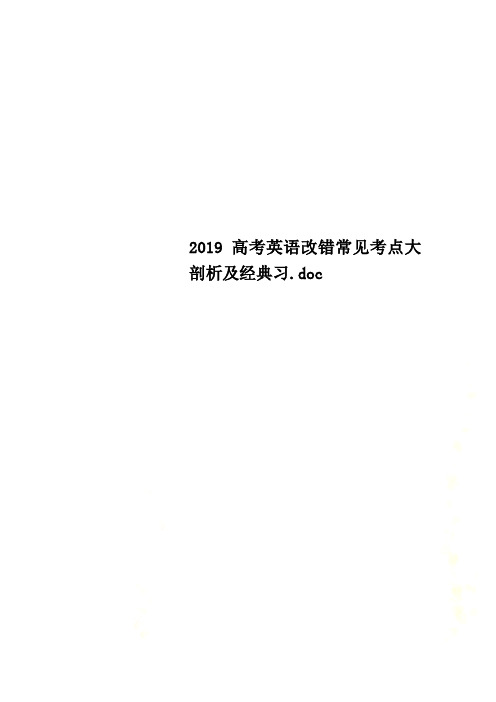
2019高考英语改错常见考点大剖析及经典习.doc高考英语改错常见考点大剖析及经典习题㈠高考短文改错命题焦点:短文改错是全国统一高考中一种综合性很强的试题。
短文改错的文章多采用记叙文,有时也用说明文。
在100词左右的短文中设有十个小题,该题的设计形式有四种:1.该行错一个词,找出来并改正。
2.该行多一个词,找出来并去掉。
3.该行缺一个词,补上一词。
4.该行没错,不改动。
从近几年的高考题来看,这四种形式的考查情况大致为:多一词1~2处;缺一词1~2处;正确1处;错一词5~6处。
这种题说到底是考查用词、词的搭配、词法、句法及语篇中的行文逻辑等各方面的水平。
换句话说,这是一种比较全面的考查。
我们在平时的学习中就要注意做到词不离句,句不离篇,要特别注意词的用法、搭配和语法分析能力的培养。
平时打好这种基础,就为正确地解题准备了条件。
㈡短文改错解题技巧:⒈快速阅读掌握大意。
短文改错时应先从头到尾快速读一遍,了解其大意,这样有助于了解其中的逻辑关系,对时态、人称等都心中有数。
十行中一般有九行有错误,一行无错,如发现并纠正错误,首要的任务是对全段文字有个整体的理解,阅读中注意句子的时态、语态、语气、非谓语动词或动词短语,注意句子中的名词、数词,以及其他词性的语法要求,注意句子之间的逻辑关系,注意段落的主旨内容,注意整篇短文的中心内容,这样才更加有效地完成改错。
⒉在改错过程中,要结合上下文语境来观察,不要只盯住一行。
按照上述的原则,对语法、句法、逻辑词义、搭配等诸方面进行综合考查分析并改正错误,应看上下文中有无逻辑关系上的错误,有无语法修饰上的错误,有无惯用法方面的错误。
如果没有发现明显错误,则分别检查时态、人称,单复数,主谓一致等各项。
⒊检查句与句之间的逻辑关系是否恰当。
如有不妥之处,看看是否关联词有问题。
⒋整篇做完后,认真检查一遍,注意其中逻辑关系是否合理,时态人称等是否一致。
㈢短文改错常见考点:⒈多一词:抽象名词前多一冠词:如:Modern people know more about the health.(去掉the )专有名词前多一冠词:如:the England(去掉the ), the Hebei Province(去掉the ), the Beijing Airport(去掉the )固定词组中名词前多一冠词:如:go to the school(去掉the ), go to the prison(去掉the ),at the work(去掉the ), in the bed(去掉the ), go to the hospital(去掉the ), set a fire to sth (去掉a)., at the first(去掉the ), the most of them(去掉the ),at the noon(去掉the ), make a rapid progress(去掉a ),a plenty of(去掉a )表示交通工具的和by连用的名词前多一冠词:如:by the air(去掉the ), by the bus(去掉the ), by the ship(去掉the )表示体育活动的名词前;如:play the football(去掉the ), play the basketball(去掉the )表示节日(常含有Day)的名词前多一冠词:如:the National Day(去掉the ), the May Day(去掉the )表示“非常”意思的“most”前多一冠词:如:He is the most hardworking. (去掉the )某种让步状语从句中名词前面多一冠词:如:A child as he is, he knows a lot. (去掉a )在表示时间的“one/ this/ every + 名词”的时间状语前多一介词:如:on one day(去掉on ), on that evening(去掉on ), in every week(去掉in)某些及物动词因混淆词义而多一介词或副词;如:①raise up one’s hand(去掉up )②pick(摘)up apples(去掉up )③return back(回来) (去掉back)④repeat again(去掉again)②How I regretted the hours which wasted in the woods. (去掉which )定语从句中多一代词:如:①The film that I saw it yesterday is good. (去掉it )②This is the very book that I am looking for it. (去掉it )③He is the man we talked about him. (去掉him )在“连词+ 分词”结构中多一代词:如:①While I waiting for a bus, I found a wallet lying on the ground.(去掉waiting前的I )②If it heated, ice turns to water. (去掉it)在某些固定结构中多了“to”,如:①I would rather stay at home than to go to the cinema with you.(去掉第一个to)②Why not to take a holiday for a good rest? (去掉to )③She said she would rather not to discuss it right now. (去掉to )④You had better not to go there. (去掉to )⑤I made them to do the cleaning. (去掉to )⑥I had him to clean the room. (去掉to )⑦We noticed him to walk out of the garden. (去掉to )⑧I often hear her to sing the song. (去掉to )⒉缺一词:表一类事物的单数可数名词前缺冠词:如:A/The ∧horse is a useful animal.单数可数名词前缺少表示“一”的不定冠词,如:①There is a∧library in every town in Britain.②Good health is a∧person’s most valuable possession.特指名词前缺定冠词the ,如:①Have you read the∧books by Mark Twain?②The book on the∧desk is mine.作状语的动词不定式缺“to”,如:①David and I want to go off to∧find help…②…and other organizations are working to∧improve health all over the world.形容词最高级前缺定冠词the ,如:one of the∧earliest kinds of moneysuch或so与单数名词连用时不可缺少冠词,如:①This is such a∧good book that I like it.②He is so good a∧student that all the teachers like him.姓氏复数形式(表示一家人或夫妇二人)前面缺一冠词,如:The∧Turners are watching TV.表示世纪的某个年代前面缺一冠词,如:In the∧1870s, when Marx was already in his fifties, he found it important to study the situation in Russia.表示“一个名叫…的人”前缺一冠词,如:A∧Miss Lee is waiting for you outside.“形容词比较级+ of the two”前缺一冠词,如:He is the∧taller of the two.某些固定短语中缺一冠词,如:in the∧end, go to the∧cinema, in the∧daytime, on the∧right抽象名词具体化时前面缺一冠词,如:①The meeting held yesterday was a∧success.②It is a∧famous Chinese tea.③The experiment turned out to be a∧failure.作定语的不定式后缺少必要的介词,如:①He is looking for a room to live in∧.②There is nothing to worry about∧.③I need a pen to write with∧.一些固定短语或习惯搭配中缺介词,如:①He didn’t reply to∧my letter.②Are you sure about∧it?③Thousands and thousands of∧people like watching TV.④Dr Wang started to operate on∧them at once.⑤He grasped my hands and asked for∧my name and address.⑥Just then a man came to me and asked what I was looking for∧.并列句缺并列连词,如:①He was tired and∧it was getting dark.②He asked me to go, so∧I went.③He is old, but∧he is still strong.名词性从句中缺少必要的连接词,如:①That∧he will come is certain.②It is uncertain whether∧he can come or not.③We all know the truth that∧the earth goes round the sun.④They expressed the hope that∧they would come over to visit China again.定语从句中缺少必要的关系代词,如:①The police have found the knife with which∧the man killed his wife.②The changes that/ which∧have taken place are great.③Is this the boy who∧did the good deed?缺少为避免重复而使用的替代词“that或those”,如:①The population is much larger than that∧of Canada.②The weather of Beijing is as good as that∧of Shijiazhuang.③The bikes made in Shanghai are better than those∧made in Beijing.“make, let, have, see, hear, notice, observe, watch”等动词变成被动语态时缺少“to”,如:①They were made to∧work fourteen hours a day by the landlord.②He was noticed to∧cross the street.为避免重复而使用的不定式省略形式缺少了to,如:①If you don’t want to do it, you don’t need to∧.②I wanted to go out, but my mother told me not to∧.③Don’t leave the room unless I tell you to∧.⒊错一词:名词的单复数错误,如:①Different people speak different language.(language →languages)②We have been to Europe many time.( time→times)③His word were a grea t encouragement to me. (word→words)④There are branch library in many villages. (library→libraries)动词时态、语态的错误,如:①Last Saturday police cars hurry to the tallest building in New York.( hurry →hurried)②Today it is much easier to be healthy than it is in the past.( is →was)③Anyone may borrow books, and it cost nothing to borrow them. (cost→costs)形容词、副词混用错误(修饰行为动词、形容词、过去分词、整个句子应用副词,修饰系动词、名词应用形容词)及其他词性错误,如:①I’m sure we’ll have a wonderfully time together. (wonderfully →wonderful)②A player’s native langua ge is not importance. (importance→important)③Also, the sport teaches us the important of obedience. ( important→importance)④Unfortunate, there are too many people…(Unfortunate→Unfortunately)人称代词、物主代词、反身代词的错误,如:①The game speaks for themselves. ( themselves →itself)②The Blacks did his best to make me feel at home. ( his→their)非谓语动词使用错误,如:①I was often a little tired after a day’s work and watch TV demands very little effort. ( watch →watching 动名词短语作主语)②I am looking forward to seeing you and enjoy the talk.(enjoy→enjoying, 与seeing 是平行结构)③He always went there to have his hair cut and wash.(wash→washed,与cut是平行结构,采用的是have sth done结构)同义词、近义词、形似词错误,如:across与through, among 与between, except与besides, like与as, ago 与before, accept 与receive, living 与alive, let与allow, lonely与alone, too 与either, cost 、spend 、pay与take, hard与hardly, worth与worthy, raise与rise, likely与possible, near 与nearly, lend 与borrow, job 与work, deep 与deeply, answer 与reply, high与highly, sit 与seat, wide 与widely, try与manage, neither 与either, so 与such, every day 与everyday, all与both, every 与each, find 与found(建立), lie(躺)、lie(撒谎)与lay(放置、生产), hang(挂)与hang (绞死)sound与voice, place与room, forget与leave, hope 与wish, call on与call at如:①I raised my sound so that I could be heard.(sound→voice, voice表示人的嗓音)②There isn’t any place for me in the bus.(place→room, room为不可数名词表示“空间”)③I forgot my umbrella in the classroom.(forgot→left, leave表示“剩留,把某物忘在某地”)④I hope you to come earlier next time.(hope→wish, hope后面不能跟“宾语+动词不定式”的复合结构)⑤He made such much progress that he was praised by the teacher.(such→so, 当many/ much/few/little 表示“多或少”的含义时,前面常用so)⑥I received an invitation but I didn’t receive it.(receive→a ccept, accept 表示“主观接受”)⑦You should rise your hand before asking the question.(rise→raise, rise是不及物动词,raise是及物动词)关系词用错,如:①I also enjoyed the evenings when we spent together.(when→that,先行词在定语从句中作宾语)②I’ll never forget the day that I went abroad myself.(that→when, 先行词在定语从句中作时间状语)③The tool with that he is working is called a saw.(that→which, 介词后面的关系代词不能用that )④If he will come to the ball has nothing to do with me.(If→Whether, if 不能引导主语从句)⑤The fact which water is composed of hydrogen and oxygen is undeniable.(which→that, that 引导同位语从句只起连接作用,不做句子成分)连词使用错误,如:if与unless, because与for, when与while①We tried to fix it and there was nothing we could do.( and→but)②If packages of food could be dropped from planes, the people might get hungry.(If→Unless)③He was walking by the sea while he heard a voice for help.(while→when, 此时,when不译作“当…的时候”,而表示“正在…时,这时另一件事发生了”。
高考英语:短文改错知识点总结解题指导及训练(含答案)
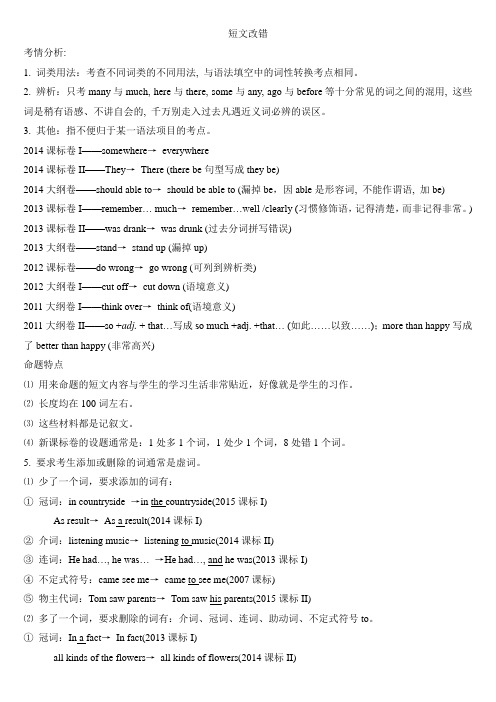
短文改错考情分析:1. 词类用法:考查不同词类的不同用法, 与语法填空中的词性转换考点相同。
2. 辨析:只考many与much, here与there, some与any, ago与before等十分常见的词之间的混用, 这些词是稍有语感、不讲自会的, 千万别走入过去凡遇近义词必辨的误区。
3. 其他:指不便归于某一语法项目的考点。
2014课标卷I——somewhere→everywhere2014课标卷II——They→There (there be句型写成they be)2014大纲卷——should able to→should be able to (漏掉be,因able是形容词, 不能作谓语, 加be) 2013课标卷I——remember… much→remember…well /clearly (习惯修饰语,记得清楚,而非记得非常。
) 2013课标卷II——was drank→was drunk (过去分词拼写错误)2013大纲卷——stand→stand up (漏掉up)2012课标卷——do wrong→go wrong (可列到辨析类)2012大纲卷I——cut off→cut down (语境意义)2011大纲卷I——think over→think of(语境意义)2011大纲卷II——so +adj.+ that…写成so much +adj. +that… (如此……以致……);more than happy写成了better than happy (非常高兴)命题特点⑴用来命题的短文内容与学生的学习生活非常贴近,好像就是学生的习作。
⑵长度均在100词左右。
⑶这些材料都是记叙文。
⑷新课标卷的设题通常是:1处多1个词,1处少1个词,8处错1个词。
5. 要求考生添加或删除的词通常是虚词。
⑴少了一个词,要求添加的词有:①冠词:in countryside →in the countryside(2015课标I)As result→As a result(2014课标I)②介词:listening music→listening to music(2014课标II)③连词:He had…, he was… →He had…, and he was(2013课标I)④不定式符号:came see me→came to see me(2007课标)⑤物主代词:Tom saw parents→Tom saw his parents(2015课标II)⑵多了一个词,要求删除的词有:介词、冠词、连词、助动词、不定式符号to。
[全]高考英语近十年全国卷短文改错题之名词和代词考点
![[全]高考英语近十年全国卷短文改错题之名词和代词考点](https://img.taocdn.com/s3/m/69a834e5b90d6c85ed3ac68b.png)
高考英语近十年全国卷短文改错题之名词和代词考点01名词考点考情分析一、近十年高考英语全国卷短文改错题名词考点分类汇总1可数名词该用复数形式误用为单数1. (2019全国卷Ⅰ)All the football player on the playground cheered loudly, saying that I had a talent for football.答案与解析:player→players。
all修饰可数名词复数。
2. (2019全国卷II)Since I was a kid, I’ve considered different job I would like to do.答案与解析:job→jobs。
different修饰可数名词复数。
3. (2019全国卷Ⅲ)I wish to have a chain of cafes in many different city. 答案与解析:city→cities。
many修饰可数名词复数。
4. (2018全国卷Ⅰ)Last winter when I went there again,they had a big separate house to raise dozens of chicken.答案与解析:chicken→chickens。
dozens of(许多)修饰可数名词复数,这里chicken是可数名词,意思是“小鸡”。
5. (2018全国卷II)After supper, we would play card games of all sort in the sitting room.答案与解析:sort→sorts。
all修饰可数名词复数。
6. (2018全国卷Ⅲ)At that moment I remembered that my father once said, “The classroom is a place for learning and that includes learning from textbooks, and mistake as well.”答案与解析:mistake→mistakes。
高考英语单句短文改错讲解及练习老师用
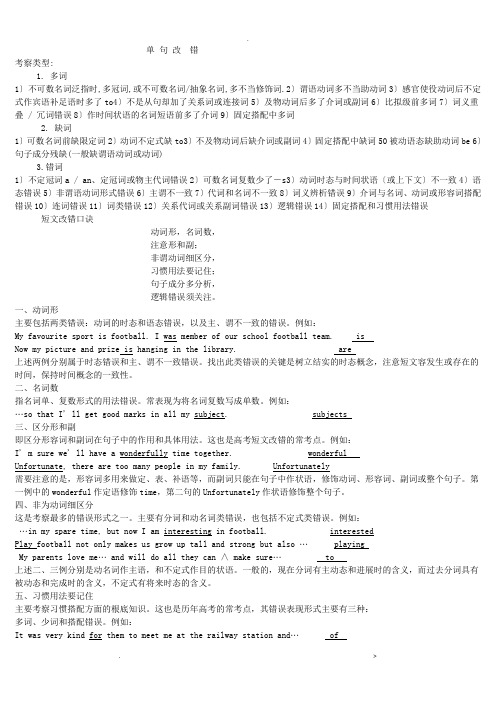
单句改错考察类型:1. 多词1〕不可数名词泛指时,多冠词,或不可数名词/抽象名词,多不当修饰词.2〕谓语动词多不当助动词3〕感官使役动词后不定式作宾语补足语时多了to4〕不是从句却加了关系词或连接词5〕及物动词后多了介词或副词6〕比拟级前多词7〕词义重叠 / 冗词错误8〕作时间状语的名词短语前多了介词9〕固定搭配中多词2. 缺词1〕可数名词前缺限定词2〕动词不定式缺to3〕不及物动词后缺介词或副词4〕固定搭配中缺词50被动语态缺助动词be 6〕句子成分残缺(一般缺谓语动词或动词)3.错词1〕不定冠词a / an、定冠词或物主代词错误2〕可数名词复数少了-s3〕动词时态与时间状语〔或上下文〕不一致4〕语态错误5〕非谓语动词形式错误6〕主谓不一致7〕代词和名词不一致8〕词义辨析错误9〕介词与名词、动词或形容词搭配错误10〕连词错误11〕词类错误12〕关系代词或关系副词错误13〕逻辑错误14〕固定搭配和习惯用法错误短文改错口诀动词形,名词数,注意形和副;非谓动词细区分,习惯用法要记住;句子成分多分析,逻辑错误须关注。
一、动词形主要包括两类错误:动词的时态和语态错误,以及主、谓不一致的错误。
例如:My favourite sport is football. I was member of our school football team. isNow my picture and prize is hanging in the library. are上述两例分别属于时态错误和主、谓不一致错误。
找出此类错误的关键是树立结实的时态概念,注意短文容发生或存在的时间,保持时间概念的一致性。
二、名词数指名词单、复数形式的用法错误。
常表现为将名词复数写成单数。
例如:…so that I’ll get good marks in all my subject. subjects三、区分形和副即区分形容词和副词在句子中的作用和具体用法。
高考英语改错题考点与技巧分析

高考英语改错题考点与技巧分析高考英语短文改错解题技巧设错基本原则在短文改错题中,绝大多数情况下会出现多一个词、少一个词、错一个词等错误。
其中多一个词的情况,常常出现在助动词、不定式符号to、语义重复、固定搭配等方面。
少词现象则主要出现在冠词、不定式符号to等方面。
而错词现象则主要在动词时态、非谓语、行文逻辑关系、名词单复数、形容词和副词、代词、连词、介词等方面。
常见错误类型1.谓语动词的错误是历年考试的重点和热点。
常见的动词错误类型包括:①现在时与过去时混用;② and前后动词时态不一致;③主谓不一致;④缺少谓语动词,特别是be动词;⑤第三人称单数形式错用;⑥主动语态和被动语态错用。
例如:1) They did not want me to do any work at home。
they wanted me to devote all my time to my studies。
(将did改为do,错误类型属于①)2) As we climbed the mountain。
we fed monkeys。
XXX(将visiting改为visited,错误类型属于②)3) One evening she told me that something happened whenher parents were out。
(主谓不一致)4) There will be an important game next month。
(将will后加be)5) For the most part。
students work to earn money for their own use。
(缺谓语动词)6) But the most wonderful thing about Jack was his XXX(主语是第三人称单数)讲练结合时态错误在短文中,主从句时态的不一致,或某一时态与文章主体时态不一致,都容易出现错误。
高考英语短文改错题考点分析(精选五篇)

高考英语短文改错题考点分析(精选五篇)第一篇:高考英语短文改错题考点分析高考英语短文改错题九大考点分析高考短文改错题具有“高起点、低落点”的特点,对学生的语言感觉和语言能力要求较高,但改正的错误往往比较简单。
很多学生做不好改错题不是因为没有掌握这些语法知识,而是不能通过语感找出错误。
所以培养学生有意识地去注意一些高考短文改错的常考点非常重要。
综合近年的高考题我们可以看出主要在以下语法项目上设题:1.名词和限制词的搭配主要涉及可数与不可数名词与冠词、指示代词、物主代词的错误搭配,以及名词的单复数的误用。
2.动词的时态、语态以及非谓语动词常出现在总体时态为过去或现在时中间杂有另一时态的现象,以及动词的谓语与非谓语形式、非谓语动词之间的误用。
3.代词的误用主要是代词的格与数的错用。
如男性用了女性代词,单数用了复数代词或相反;应当用形容词性的物主代词用了名词性等。
4.数词的误用主要是序数词与基数词的混用和错用,以及hundred, thousand, dozen, score等词和具体数量词连用时的用法以及表示约数的用法。
5.形容词与副词主要涉及到形容词和副词的原级、比较级与最高级的误用,以及形容词和副词的误用等。
6.考查英语中的并列现象在一些英语中的并列结构中没有用并列的语法结构,如并列连词连接的两个部分等。
7.考查上下文的逻辑关系but, and, so,however, otherwise等一些并列连词和连接副词的误用。
before, after, when, until, since等状语从句引导词的误用等。
还有肯定和否定的误用等。
8.一些相似结构的误用如used to do, be used to do, be used to doing等结构的误用。
9.惯用法的搭配改错步骤上述9个方面,同学们在做题时只要稍加留意,找出错误的比率就会增大很多。
做短文改错题时一般遵循以下几个步骤:1.先通读全文。
高考英语短文改错题九大考点分析
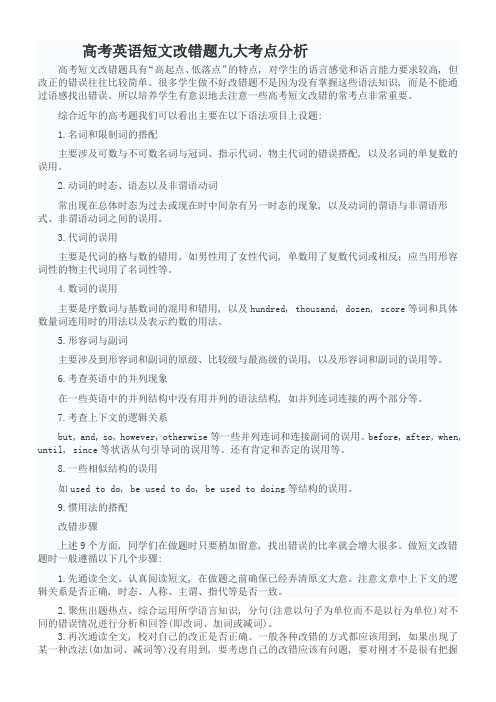
高考英语短文改错题九大考点分析高考短文改错题具有“高起点、低落点”的特点, 对学生的语言感觉和语言能力要求较高, 但改正的错误往往比较简单。
很多学生做不好改错题不是因为没有掌握这些语法知识, 而是不能通过语感找出错误。
所以培养学生有意识地去注意一些高考短文改错的常考点非常重要。
综合近年的高考题我们可以看出主要在以下语法项目上设题:1.名词和限制词的搭配主要涉及可数与不可数名词与冠词、指示代词、物主代词的错误搭配, 以及名词的单复数的误用。
2.动词的时态、语态以及非谓语动词常出现在总体时态为过去或现在时中间杂有另一时态的现象, 以及动词的谓语与非谓语形式、非谓语动词之间的误用。
3.代词的误用主要是代词的格与数的错用。
如男性用了女性代词, 单数用了复数代词或相反;应当用形容词性的物主代词用了名词性等。
4.数词的误用主要是序数词与基数词的混用和错用, 以及hundred, thousand, dozen, score等词和具体数量词连用时的用法以及表示约数的用法。
5.形容词与副词主要涉及到形容词和副词的原级、比较级与最高级的误用, 以及形容词和副词的误用等。
6.考查英语中的并列现象在一些英语中的并列结构中没有用并列的语法结构, 如并列连词连接的两个部分等。
7.考查上下文的逻辑关系but, and, so, however, otherwise等一些并列连词和连接副词的误用。
before, after, when, until, since等状语从句引导词的误用等。
还有肯定和否定的误用等。
8.一些相似结构的误用如used to do, be used to do, be used to doing等结构的误用。
9.惯用法的搭配改错步骤上述9个方面, 同学们在做题时只要稍加留意, 找出错误的比率就会增大很多。
做短文改错题时一般遵循以下几个步骤:1.先通读全文。
认真阅读短文, 在做题之前确保已经弄清原文大意。
2023年高考英语语法填空与短文改错知识点归纳总结含答案
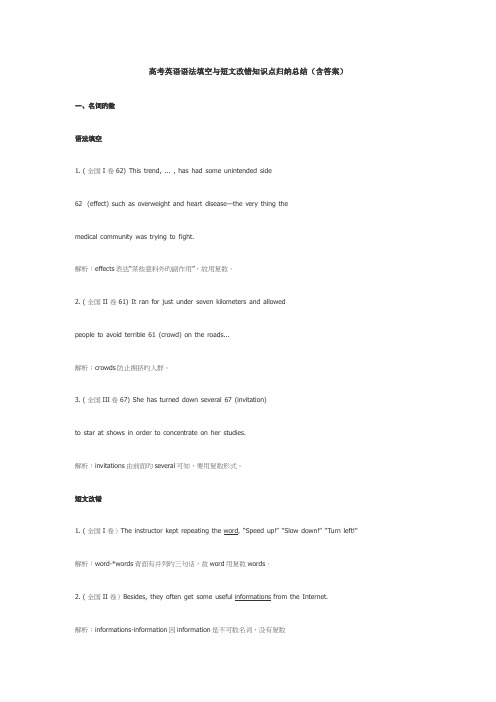
高考英语语法填空与短文改错知识点归纳总结(含答案)一、名词旳数语法填空1. ( 全国 I 卷 62) This trend, ... , has had some unintended side62 (effect) such as overweight and heart disease—the very thing themedical community was trying to fight.解析:effects表达“某些意料外旳副作用”,故用复数。
2. ( 全国 II 卷 61) It ran for just under seven kilometers and allowedpeople to avoid terrible 61 (crowd) on the roads...解析:crowds防止拥挤旳人群。
3. ( 全国III卷 67) She has turned down several 67 (invitation)to star at shows in order to concentrate on her studies.解析:invitations由前面旳several可知,要用复数形式。
短文改错解析:word-*words背面有并列旳三句话,故word用复数words。
解析:informations-information因information是不可数名词,没有复数形式。
二、代词阅读理解Some of the world’s most famous musicians recently gathered in Paris and New Orleans to celebrate the first an nual International Jazz Day...Despite the celebrations, though, in the U. S. the jazz audience continues to shrink and grow older, and the mu sic has failed to connect with younger generations.en the audience for jazz, make the music more accessible, and preserve its history and culture.29. What does the underlined word “that” in Paragraph 3 refer to?A. Jazz becoming more accessible.B. The production of jazz growing faster.C. Jazz being less popular with the young.D. The jazz audience becoming larger.解析:指代前句中即前一段旳最终一句中旳the music has failed to connect 6with younger generations,比较各选项,只有C对旳。
高考英语改错常见考点大剖析及经典习题(2021年整理)
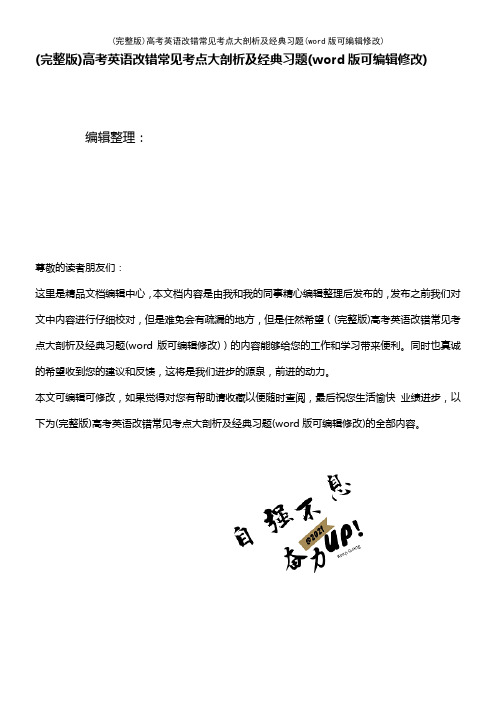
(完整版)高考英语改错常见考点大剖析及经典习题(word版可编辑修改) 编辑整理:尊敬的读者朋友们:这里是精品文档编辑中心,本文档内容是由我和我的同事精心编辑整理后发布的,发布之前我们对文中内容进行仔细校对,但是难免会有疏漏的地方,但是任然希望((完整版)高考英语改错常见考点大剖析及经典习题(word版可编辑修改))的内容能够给您的工作和学习带来便利。
同时也真诚的希望收到您的建议和反馈,这将是我们进步的源泉,前进的动力。
本文可编辑可修改,如果觉得对您有帮助请收藏以便随时查阅,最后祝您生活愉快业绩进步,以下为(完整版)高考英语改错常见考点大剖析及经典习题(word版可编辑修改)的全部内容。
高考英语改错常见考点大剖析及经典习题㈠高考短文改错命题焦点:短文改错是全国统一高考中一种综合性很强的试题.短文改错的文章多采用记叙文,有时也用说明文。
在100词左右的短文中设有十个小题,该题的设计形式有四种:1.该行错一个词,找出来并改正。
2.该行多一个词,找出来并去掉.3.该行缺一个词,补上一词。
4.该行没错,不改动。
从近几年的高考题来看,这四种形式的考查情况大致为:多一词1~2处;缺一词1~2处;正确1处;错一词5~6处。
这种题说到底是考查用词、词的搭配、词法、句法及语篇中的行文逻辑等各方面的水平。
换句话说,这是一种比较全面的考查。
我们在平时的学习中就要注意做到词不离句,句不离篇,要特别注意词的用法、搭配和语法分析能力的培养。
平时打好这种基础,就为正确地解题准备了条件。
㈡短文改错解题技巧:⒈快速阅读掌握大意。
短文改错时应先从头到尾快速读一遍,了解其大意,这样有助于了解其中的逻辑关系,对时态、人称等都心中有数。
十行中一般有九行有错误,一行无错,如发现并纠正错误,首要的任务是对全段文字有个整体的理解,阅读中注意句子的时态、语态、语气、非谓语动词或动词短语,注意句子中的名词、数词,以及其他词性的语法要求,注意句子之间的逻辑关系,注意段落的主旨内容,注意整篇短文的中心内容,这样才更加有效地完成改错。
高考英语短文改错常考知识点

高考英语短文改错常考知识点高考英语中,短文改错是一道全面考察考生英语语法水平和语感的题型。
因此,我们需要了解一些常见的错误类型和改正方式。
本文将从常见错误类型、语法知识点和解题技巧三个方面来详细介绍和分析。
一、常见错误类型1. 词汇错误此类错误是指考生用错了某个单词的形态或意义,或者不恰当的使用了某个短语。
例如:原句:He seem to be worried about something.改错:He seems to be worried about something.解析:此处动词seem不能用于第二人称和第三人称单数形式,需改为seems。
2. 时态错误考生常常在使用时态时出现错误,例如将过去式用于现在情况,或将现在时用于过去事情。
例如:原句:I forget to bring my book with me yesterday.改错:I forgot to bring my book with me yesterday.解析:此处应该用过去时态,因为时间是过去的事情。
3. 冠词错误冠词错误包括不使用或多余使用冠词、使用错误的冠词等。
例如:原句:I’m going to see the Dr. Smith this afternoon.改错:I’m going to see Dr. Smith this afternoon.解析:在这里,Dr.是一个专业的称呼,不需要加上冠词the。
4. 主谓一致错误主谓一致错误是指主语和谓语在人称、数方面的不一致。
例如:原句:The news on TV are interesting.改错:The news on TV is interesting.解析:news是一个不可数名词,因此应该用单数动词is。
二、语法知识点1. 动词时态英语动词时态繁多,不同的时态表达不同的时间关系。
在修改时,应根据语境选择正确的时态。
例如:原句:He goes to school on foot everyday.改错:He goes to school on foot every day.解析:此处应用一般现在时,表示习惯性动作或真理。
高考英语短文改错常考考点及历年真题

高考英语短文改错测试重点及分类解析第一章短文改错测试重点及分类解析根据短文改错的命题特点,我们可以按照以下四步进行备考快速练习。
第一步:审题。
通读全文,了解大意。
全面把握文章整体(时态、题材及内容)。
第二步:重读全文,应先确定一些明显的错误,以便疏通短文,化繁为简,为后面解题打开思路。
许多问题可在这一阶段得到解决。
从词法、句法到行文逻辑三方面着手,逐句而不是逐行地分析、找错。
第三步:综观全篇,看错误类型的比例是否得当、前后逻辑是否一致、有无前后矛盾等现象。
第四步:认真检查,避免出现以下错误:符号不规范;一个词改为几个或几个改为一个;该大写的未大写;合成词只改了其中一部分等。
下面,我们根据词性不同,来对改错题目进行分类解析。
第一节名词在短文改错中见到名词时,应检查是否有数、格及名词前限定词用法等错误。
汉语中的名词在形式上无复数变化,而是通过在名词前加数词来表示;英语则不同,除了在名词前加数词之外,如果是可数名词,还应将该名词变为复数形式。
1. 检查句中名词的单复数形式是否符合句意。
2. 检查句中有无可数名词和不可数名词的误用。
3. 检查句中有无所有格的误用。
4. 检查句中有无名词前限定词的误用。
练习请改正下列句子中的语法错误,注意名词的使用。
1. He is on good term with me.2. He is a generous fellow, and will soon make friend with you again.3. His opinion is considered to be great value.4. He sent his daughter to a girl’s high school.5. Give me three spoonful of sugar.6. His eyes are as blue as a Scandinavian.7. A few peoples live to be a hundred years old.8. Aunt Mary returned home after ten year’s absence.9. He is a friend of my brother.10. The observation of the law is the first duty of every citizen.注释1. term → terms, term的复数形式表示条件、关系, on good terms with...意为“与……关系良好”。
高考英语短文改错题型总结语法错误知识点清单与总结
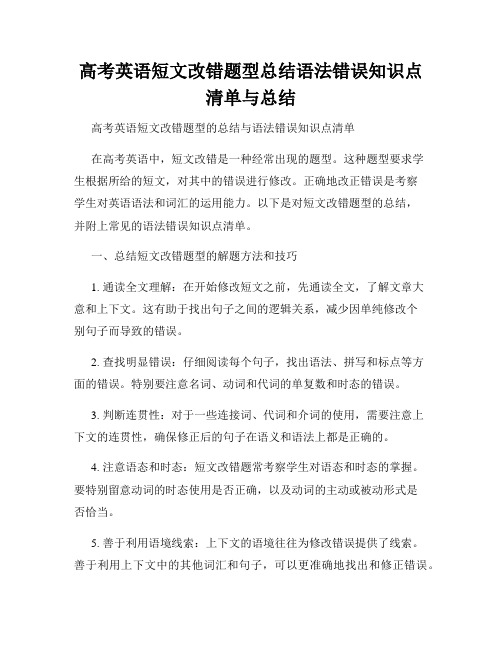
高考英语短文改错题型总结语法错误知识点清单与总结高考英语短文改错题型的总结与语法错误知识点清单在高考英语中,短文改错是一种经常出现的题型。
这种题型要求学生根据所给的短文,对其中的错误进行修改。
正确地改正错误是考察学生对英语语法和词汇的运用能力。
以下是对短文改错题型的总结,并附上常见的语法错误知识点清单。
一、总结短文改错题型的解题方法和技巧1. 通读全文理解:在开始修改短文之前,先通读全文,了解文章大意和上下文。
这有助于找出句子之间的逻辑关系,减少因单纯修改个别句子而导致的错误。
2. 查找明显错误:仔细阅读每个句子,找出语法、拼写和标点等方面的错误。
特别要注意名词、动词和代词的单复数和时态的错误。
3. 判断连贯性:对于一些连接词、代词和介词的使用,需要注意上下文的连贯性,确保修正后的句子在语义和语法上都是正确的。
4. 注意语态和时态:短文改错题常考察学生对语态和时态的掌握。
要特别留意动词的时态使用是否正确,以及动词的主动或被动形式是否恰当。
5. 善于利用语境线索:上下文的语境往往为修改错误提供了线索。
善于利用上下文中的其他词汇和句子,可以更准确地找出和修正错误。
6. 注意文章的逻辑连贯性:修正错误时,不仅要纠正句子中的语法错误,还要维持全文的逻辑连贯性。
即修正错误后,整篇文章在语义和段落结构上应该是自然而流畅的。
二、语法错误知识点清单1. 名词的单复数错误:单数名词缺少冠词、名词的复数形式错误等。
2. 惯用表达错误:固定搭配的短语或词组使用错误。
3. 代词的误用:代词的主、宾格使用错误、代词的单复数形式错误等。
4. 动词时态和语态错误:动词时态使用错误、主谓一致错误、被动语态的错误使用等。
5. 介词和介词短语的使用错误:介词搭配错误,介词短语的位置错误等。
6. 形容词和副词的误用:形容词和副词的比较级和最高级错误使用、形容词和副词的位置错误等。
7. 冠词的使用错误:冠词缺失或多余、冠词的使用错误等。
高考英语短文改错考点分类解析.doc

高考英语短文改错考点分类解析.doc1、高考英语短文改错考点分类解析主谓一致一、考点规律分析从广义来说,英语中的一致问题涉及多个方面,如主谓一致、人称的一致、并列结构的前后一致等。
由于人称的一致已归入“代词”考点、并列结构的前后一致已分别归入非谓语动词、时态等,所以这里只归纳主谓一致问题。
二、真题单句归纳(1)Billwasstandingatthesideofthecar,talkingtotwomenwhowashe lpinghimtorepairit.(was改为were,因先行词twomen是复数,所以修饰该先行词的定语从句的谓语动词也应用复数)(全国卷)(2)Play2、ingfootballnotonlymakesusgrowuptallandstrongbutalsogiveusas enseoffairplayandteamspirit.(give改为gives,它与makes为平行结构,构成并列谓语动词)(全国卷)(3)Nowmypictureandtheprizeishanginginthelibrary.(is改为are,因主语是mypictureandtheprize,故谓语动词要用复数)(全国卷)(4)Butthenthereisalwaysmoremysteriestolookinto.(3、is改为are,因其后的mysteries为复数,故谓语动词要用复数)(北京春季卷)(5)Butnotallinformationaregoodtosociety.(are改为is,因为主语是不行数名词information,表单数)(广西卷)(6)Sothen,aconcertcostsomuch.Imayjustlistentomusic.(cost改为costs,因主语是单数aconcert,依据全文用的都是如今的时态,故用一般如今时)(年四川卷)(7)IfIlistentomyownrecords,therearenoneedto4、spendmoney.(are改为is,因为在therebe结构中的be用is还是用are,由紧跟在be后的那个名词的单复数来确定,此处noneed是单数,所以用is)(四川卷)(8)…youwillprobablywanttojointheStampCollectors’Clubwh ichexisttoaddmorestampstoyourcollection.(exist改为exists,因主语which是指theStampCollectors’Club,这是单数,所以用exists)(浙江卷)(10)Oneeveningshetol5、dmethatsomethinghappenedwhentheirparentswasout.(was 改为were,因为主语theirparents是复数,所以不用was要用were)(年福建卷)三、模拟单句演练(1)HerparentswereinShanghai,andsowashis.(2)Asisknowntousall ,rememberingEnglishwordsarenoteasy.(3)Thepolicewaslookingfo rthemurderereverywhereinthecity.(4)WritingEnglis6、handspeakingitisdifferentthings.(5)Itistheparentsandtheirso nwhowantstobuythebicycle.(6)Whathesaidatthemeetingwereveryi mportanttous. 【参考答案】(1)was改为were,因其主语his为hisparents之略,为复数。
高考英语改错常见考点大剖析及经典习题之欧阳德创编

高考英语改错常见考点大剖析及经典习题㈠高考短文改错命题焦点:短文改错是全国统一高考中一种综合性很强的试题。
短文改错的文章多采用记叙文,有时也用说明文。
在100词左右的短文中设有十个小题,该题的设计形式有四种:1.该行错一个词,找出来并改正。
2.该行多一个词,找出来并去掉。
3.该行缺一个词,补上一词。
4.该行没错,不改动。
从近几年的高考题来看,这四种形式的考查情况大致为:多一词1~2处;缺一词1~2处;正确1处;错一词5~6处。
这种题说到底是考查用词、词的搭配、词法、句法及语篇中的行文逻辑等各方面的水平。
换句话说,这是一种比较全面的考查。
我们在平时的学习中就要注意做到词不离句,句不离篇,要特别注意词的用法、搭配和语法分析能力的培养。
平时打好这种基础,就为正确地解题准备了条件。
㈡短文改错解题技巧:⒈快速阅读掌握大意。
短文改错时应先从头到尾快速读一遍,了解其大意,这样有助于了解其中的逻辑关系,对时态、人称等都心中有数。
十行中一般有九行有错误,一行无错,如发现并纠正错误,首要的任务是对全段文字有个整体的理解,阅读中注意句子的时态、语态、语气、非谓语动词或动词短语,注意句子中的名词、数词,以及其他词性的语法要求,注意句子之间的逻辑关系,注意段落的主旨内容,注意整篇短文的中心内容,这样才更加有效地完成改错。
⒉在改错过程中,要结合上下文语境来观察,不要只盯住一行。
按照上述的原则,对语法、句法、逻辑词义、搭配等诸方面进行综合考查分析并改正错误,应看上下文中有无逻辑关系上的错误,有无语法修饰上的错误,有无惯用法方面的错误。
如果没有发现明显错误,则分别检查时态、人称,单复数,主谓一致等各项。
⒊检查句与句之间的逻辑关系是否恰当。
如有不妥之处,看看是否关联词有问题。
⒋整篇做完后,认真检查一遍,注意其中逻辑关系是否合理,时态人称等是否一致。
㈢短文改错常见考点:⒈多一词:抽象名词前多一冠词:如:Modern people know more about the health.(去掉the )专有名词前多一冠词:如:the England(去掉the ), the Hebei Province(去掉the ), the Beijing Airport(去掉the )固定词组中名词前多一冠词:如:go to the school(去掉the ), go to the prison (去掉the ),at the work(去掉the ), in the bed (去掉the ), go to the hospital(去掉the ), set a fire to sth (去掉a)., at the first(去掉the ), the most of them(去掉the ),at the noon(去掉the ), make a rapid progress(去掉a ),a plenty of(去掉a )表示交通工具的和by连用的名词前多一冠词:如:by the air(去掉the ), by the bus(去掉the ), by the ship(去掉the )表示体育活动的名词前;如:play the football(去掉the ), play the basketball(去掉the )表示节日(常含有Day)的名词前多一冠词:如:the National Day(去掉the ), the May Day(去掉the )表示“非常”意思的“most”前多一冠词:如:He is the most hardworking. (去掉the )某种让步状语从句中名词前面多一冠词:如:A child as he is, he knows a lot. (去掉a )在表示时间的“one/ this/ every + 名词”的时间状语前多一介词:如:on one day(去掉on ), on that evening(去掉on ), in every week(去掉in)某些及物动词因混淆词义而多一介词或副词;如:①raise up one’s hand(去掉up )②pick(摘)up apples(去掉up )③return back(回来) (去掉back)④repeat again(去掉again)⑤play with them in the match(去掉with )⑥marry with the man(去掉with )⑦serve for the people(去掉for )⑧enter into the room(去掉into)⑨I learn English every day to improve it better(去掉better ).表示地点的副词前多一介词:如:①go to there(去掉to )②drive to home(去掉to)③return to home(去掉to )某些动词、连词、介词或副词后面多了一个介词:如:①beca use of his left leg was broken(去掉of)②instead of he developed his love for the theatre(去掉of )③I looked at but could see nothing. (去掉at)④join in the army(去掉in )状语从句和主句间多一并列连词:如:①Although he is very busy, but he often helps us with housework. (去掉but )②As the weather was good, so I decided togo there yesterday. (去掉so)充当状语的分词和主句之间多了并列连词:如:①Her husband died, and leaving her three children. (去掉and )②He sat under the tree and reading a magazine. (去掉and )作定语的分词前多一代词:如:①The child who reading a book is her brother.(去掉who)②How I regretted the hours which wasted in the woods. (去掉which )定语从句中多一代词:如:①The film that I saw it yesterday is good. (去掉it )②This is the very book that I am looking for it. (去掉it )③He is the man we talked about him. (去掉him )在“连词+ 分词”结构中多一代词:如:①While I waiting for a bus, I found a wallet lying on the ground. (去掉waiting前的I )②If it heated, ice turns to water. (去掉it)在某些固定结构中多了“to”,如:①I would rather stay at home than to go to the cinema with you. (去掉第一个to)②Why not to take a holiday for a good rest?(去掉to )③She said she would rather not to discuss it right now. (去掉to )④You had better not to go there. (去掉to )⑤I made them to do the cleaning. (去掉to )⑥I had him to clean the room. (去掉to )⑦We noticed him to walk out of the garden. (去掉to )⑧I often hear her to sing the song. (去掉to )⒉缺一词:表一类事物的单数可数名词前缺冠词:如:A/The ∧horse is a useful animal.单数可数名词前缺少表示“一”的不定冠词,如:①There is a∧ library in every town in Britain.②Good health is a∧ person’s most valuable possession.特指名词前缺定冠词the ,如:①Have you read the∧ books by Mark Twain?②The book on the∧ desk is mine.作状语的动词不定式缺“to”,如:①David and I want to go off to∧ find help…②…and other organizations are working to∧ improve health all over the world.形容词最高级前缺定冠词the ,如:one of the∧ earliest kinds of moneysuch或so与单数名词连用时不可缺少冠词,如:① This is such a∧ good book that I like it.② He is so good a∧ student that al l the teachers like him.姓氏复数形式(表示一家人或夫妇二人)前面缺一冠词,如:The∧ Turners are watching TV.表示世纪的某个年代前面缺一冠词,如:In the∧ 1870s, when Marx was already in his fifties, he found it important to study the situation in Russia.表示“一个名叫…的人”前缺一冠词,如:A∧ Miss Lee is waiting for you outside.“形容词比较级+ of the two”前缺一冠词,如:He is the∧ taller of the two.某些固定短语中缺一冠词,如:in the∧ end, go to the∧ cinema, in the∧ daytime, on the∧ right抽象名词具体化时前面缺一冠词,如:①The meeting held yesterday was a∧ success.②It is a∧ famous Chinese tea.③The experiment turned out to be a∧ failure.作定语的不定式后缺少必要的介词,如:①He is looking for a room to live in∧.②There is nothing to worry about∧.③I need a pen to write with∧.一些固定短语或习惯搭配中缺介词,如:①He didn’t reply to∧ my letter.②Are you sure about∧ it?③Thousands and thousands of∧ people like watching TV.④Dr Wang started to operate on∧ them at once.⑤He grasped my hands and asked for∧ my name and address.⑥Just then a man came to me and asked what I was l ooking for∧.并列句缺并列连词,如:①He was tired and∧ it was getting dark.②He asked me to go, so∧ I went.③He is old, but∧ he is still strong.名词性从句中缺少必要的连接词,如:①That∧ he will come is certain.②It is uncertain whether∧ he can come or not.③We all know the truth that∧ the earth goes round the sun.④They expressed the hope that∧ they would come over to visit China again.定语从句中缺少必要的关系代词,如:①The police have found the knife with which∧ the man killed his wife.②The changes that/ which∧ have taken place are great.③Is this the boy who∧ did the good deed?缺少为避免重复而使用的替代词“that或those”,如:①The population is much larger than that∧ of Canada.②The weather of Beijing is as good as that∧ of Shijiazhuang.③The bikes made in Shanghai are bet ter than those∧ made in Beijing.“make, let, have, see, hear, notice, observe, watch”等动词变成被动语态时缺少“to”,如:①They were made to∧ work fourteen hoursa day by the landlord.②He was noticed to∧ cross the street.为避免重复而使用的不定式省略形式缺少了to,如:①If you don’t want to do it, you don’t need to∧.②I wanted to go out, but my mother told me not to∧.③Don’t leave the room unless I tell you to∧.⒊错一词:名词的单复数错误,如:①Different people speak different language. (language →languages)②We have been to Europe many time.( time→times)③His word were a great encouragement to me. (word→words)④There are branch library in many villages. (library→libraries)动词时态、语态的错误,如:①Last Saturday police cars hurry to the tallest building in New York.( hurr y →hurried)②Today it is much easier to be healthy than it is in the past.( is →was)③Anyone may borrow books, and it cost nothing to borrow them. (cost→costs)形容词、副词混用错误(修饰行为动词、形容词、过去分词、整个句子应用副词,修饰系动词、名词应用形容词)及其他词性错误,如:①I’m sure we’ll have a wonderfully time together. (wonderfully →wonderful)②A player’s native language is not importance. (importance→important)③Also, the sport teaches us the important of obedience. ( important→importance)④Unfortunate, there are too many people…(Unfortunate→Unfortunately)人称代词、物主代词、反身代词的错误,如:①The game speaks for themselves. ( themselves →itself)②The Blacks did his best to make me feel at home. ( his→their)非谓语动词使用错误,如:①I was often a little tired after a day’s work and watch TV demands very little effort. ( watch →watching 动名词短语作主语)②I am looking forward to seeing you and enjoy the talk.(enjoy→enjoying, 与seeing 是平行结构)③He always went there to have his hair cut and wash.(wash→washed,与cut是平行结构,采用的是have sth done结构)同义词、近义词、形似词错误,如:across与through, among 与between, except与besides, like与as, ago 与before, accept 与receive, living 与alive, let与allow, lonely与alone, too 与either, cost 、spend 、pay 与take, hard与hardly, worth与worthy, raise与rise, likely与possible, near 与nearly, lend 与borrow, job 与work, deep 与deeply, answer 与reply, high与highly, sit 与seat, wide 与widely, try与manage, neither 与either, so 与such, every day 与everyday, all与both, every 与each, find 与found(建立), lie(躺)、lie(撒谎)与lay(放置、生产), hang(挂)与hang(绞死)sound与voice, place与room, forget与leave, hope 与wish, call on与call at如:①I raised my sound so that I could be heard.(sound→voice, voice表示人的嗓音)②There isn’t any place for me in the bus.(place→room, room为不可数名词表示“空间”)③I forgot my umbrella in the classr oom.(forgot→left, leave表示“剩留,把某物忘在某地”)④I hope you to come earlier next time.(hope→wish, hope后面不能跟“宾语+动词不定式”的复合结构)⑤He madesuch much progress that he was praised by the teacher.(such→so, 当many/ much/few/little 表示“多或少”的含义时,前面常用so)⑥I received an invitation but I didn’treceive it.(receive→accept, accept 表示“主观接受”)⑦You should rise your hand before asking the question.(rise→raise, rise是不及物动词,raise是及物动词)关系词用错,如:①I also enjoyed the evenings when we spent together.(when→tha t,先行词在定语从句中作宾语)②I’ll never forget the day that I went abroad myself.(that→when, 先行词在定语从句中作时间状语)③The tool with that he is working is called a saw.(that→which, 介词后面的关系代词不能用that )④If he will come to the ball has nothing to do with me.(If→Whether, if 不能引导主语从句)⑤ The fact which water is composed of hydrogen and oxygen is undeniable.(which→that, that 引导同位语从句只起连接作用,不做句子成分)连词使用错误,如:if与unless, because与for, when与while①We tried to fix it and there was nothing we could do.( a nd→but)②If packages of food could be dropped from planes, the people might get hungry.(If→Unless)③He was walking by the seawhile he hearda voice for help.(while→when, 此时,when不译作“当…的时候”,而表示“正在…时,这时另一件事发生了”。
- 1、下载文档前请自行甄别文档内容的完整性,平台不提供额外的编辑、内容补充、找答案等附加服务。
- 2、"仅部分预览"的文档,不可在线预览部分如存在完整性等问题,可反馈申请退款(可完整预览的文档不适用该条件!)。
- 3、如文档侵犯您的权益,请联系客服反馈,我们会尽快为您处理(人工客服工作时间:9:00-18:30)。
高考英语改错常见考点大剖析及经典习题㈠高考短文改错命题焦点:短文改错是全国统一高考中一种综合性很强的试题。
短文改错的文章多采用记叙文,有时也用说明文。
在100词左右的短文中设有十个小题,该题的设计形式有四种:1.该行错一个词,找出来并改正。
2.该行多一个词,找出来并去掉。
3.该行缺一个词,补上一词。
4.该行没错,不改动。
从近几年的高考题来看,这四种形式的考查情况大致为:多一词1~2处;缺一词1~2处;正确1处;错一词5~6处。
这种题说到底是考查用词、词的搭配、词法、句法及语篇中的行文逻辑等各方面的水平。
换句话说,这是一种比较全面的考查。
我们在平时的学习中就要注意做到词不离句,句不离篇,要特别注意词的用法、搭配和语法分析能力的培养。
平时打好这种基础,就为正确地解题准备了条件。
㈡短文改错解题技巧:⒈快速阅读掌握大意。
短文改错时应先从头到尾快速读一遍,了解其大意,这样有助于了解其中的逻辑关系,对时态、人称等都心中有数。
十行中一般有九行有错误,一行无错,如发现并纠正错误,首要的任务是对全段文字有个整体的理解,阅读中注意句子的时态、语态、语气、非谓语动词或动词短语,注意句子中的名词、数词,以及其他词性的语法要求,注意句子之间的逻辑关系,注意段落的主旨内容,注意整篇短文的中心内容,这样才更加有效地完成改错。
⒉在改错过程中,要结合上下文语境来观察,不要只盯住一行。
按照上述的原则,对语法、句法、逻辑词义、搭配等诸方面进行综合考查分析并改正错误,应看上下文中有无逻辑关系上的错误,有无语法修饰上的错误,有无惯用法方面的错误。
如果没有发现明显错误,则分别检查时态、人称,单复数,主谓一致等各项。
⒊检查句与句之间的逻辑关系是否恰当。
如有不妥之处,看看是否关联词有问题。
⒋整篇做完后,认真检查一遍,注意其中逻辑关系是否合理,时态人称等是否一致。
㈢短文改错常见考点:⒈多一词:抽象名词前多一冠词:如:Modern people know more about the health.(去掉the )专有名词前多一冠词:如:the England(去掉the ), the Hebei Province(去掉the ), the Beijing Airport(去掉the )固定词组中名词前多一冠词:如:go to the school(去掉the ), go to the prison(去掉the ),at the work(去掉the ), in the bed (去掉the ), go to the hospital(去掉the ), set a fire to sth (去掉a)., at the first(去掉the ), the most of them(去掉the ),at the noon(去掉the ), make a rapid progress(去掉a ),a plenty of(去掉a )表示交通工具的和by连用的名词前多一冠词:如:by the air(去掉the ), by the bus(去掉the ), by the ship(去掉the )表示体育活动的名词前;如:play the football(去掉the ), play the basketball(去掉the )表示节日(常含有Day)的名词前多一冠词:如:the National Day(去掉the ), the May Day(去掉the )表示“非常”意思的“most”前多一冠词:如:He is the most hardworking. (去掉the )某种让步状语从句中名词前面多一冠词:如:A child as he is, he knows a lot. (去掉a )在表示时间的“one/ this/ every + 名词”的时间状语前多一介词:如:on one day(去掉on ), on that evening(去掉on ), in every week(去掉in)某些及物动词因混淆词义而多一介词或副词;如:①raise up one’s hand(去掉up )②pick(摘)up apples(去掉up )③return back(回来) (去掉back)④repeat again(去掉again)⑤play with them in the match(去掉with )⑥marry with the man(去掉with )⑦serve for the people(去掉for )⑧enter into the room(去掉into)⑨I learn English every day to improve it better(去掉better ).表示地点的副词前多一介词:如:①go to there(去掉to )②drive to home(去掉to)③return to home(去掉to )某些动词、连词、介词或副词后面多了一个介词:如:①because of his left leg was broken(去掉of)②instead of he developed his love for the theatre(去掉of )③I looked at but could see nothing. (去掉at)④join in the army(去掉in )状语从句和主句间多一并列连词:如:①Although he is very busy, but he often helps us with housework. (去掉but )②As the weather was good, so I decided to go there yesterday.(去掉so)充当状语的分词和主句之间多了并列连词:如:①Her husband died, and leaving her three children. (去掉and )②He sat under the tree and reading a magazine. (去掉and )作定语的分词前多一代词:如:①The child who reading a book is her brother.(去掉who)②How I regretted the hours which wasted in the woods. (去掉which )定语从句中多一代词:如:①The film that I saw it yesterday is good. (去掉it )②This is the very book that I am looking for it. (去掉it )③He is the man we talked about him. (去掉him )在“连词+ 分词”结构中多一代词:如:①While I waiting for a bus, I found a wallet lying on the ground.(去掉waiting前的I )②If it heated, ice turns to water. (去掉it)在某些固定结构中多了“to”,如:①I would rather stay at home than to go to the cinema with you.(去掉第一个to)②Why not to take a holiday for a good rest? (去掉to )③She said she would rather not to discuss it right now. (去掉to )④You had better not to go there. (去掉to )⑤I made them to do the cleaning. (去掉to )⑥I had him to clean the room. (去掉to )⑦We noticed him to walk out of the garden. (去掉to )⑧I often hear her to sing the song. (去掉to )⒉缺一词:表一类事物的单数可数名词前缺冠词:如:A/The ∧horse is a useful animal.单数可数名词前缺少表示“一”的不定冠词,如:①There is a∧library in every town in Britain.②Good health is a∧person’s most valuable possession.特指名词前缺定冠词the ,如:①Have you read the∧books by Mark Twain?②The book on the∧desk is mine.作状语的动词不定式缺“to”,如:①David and I want to go off to∧find help…②…and other organizations are working to∧improve health all over the world.形容词最高级前缺定冠词the ,如:one of the∧earliest kinds of moneysuch或so与单数名词连用时不可缺少冠词,如:①This is such a∧good book that I like it.②He is so good a∧student that all the teachers like him.姓氏复数形式(表示一家人或夫妇二人)前面缺一冠词,如:The∧Turners are watching TV.表示世纪的某个年代前面缺一冠词,如:In the∧1870s, when Marx was already in his fifties, he found it important to study the situation in Russia.表示“一个名叫…的人”前缺一冠词,如:A∧Miss Lee is waiting for you outside.“形容词比较级+ of the two”前缺一冠词,如:He is the∧taller of the two.某些固定短语中缺一冠词,如:in the∧end, go to the∧cinema, in the∧daytime, on the∧right抽象名词具体化时前面缺一冠词,如:①The meeting held yesterday was a∧success.②It is a∧famous Chinese tea.③The experiment turned out to be a∧failure.作定语的不定式后缺少必要的介词,如:①He is looking for a room to live in∧.②There is nothing to worry about∧.③I need a pen to write with∧.一些固定短语或习惯搭配中缺介词,如:①He didn’t reply to∧my letter.②Are you sure about∧it?③Thousands and thousands of∧people like watching TV.④Dr Wang started to operate on∧them at once.⑤He grasped my hands and asked for∧my name and address.⑥Just then a man came to me and asked what I was looking for∧.并列句缺并列连词,如:①He was tired and∧it was getting dark.②He asked me to go, so∧I went.③He is old, but∧he is still strong.名词性从句中缺少必要的连接词,如:①That∧he will come is certain.②It is uncertain whether∧he can come or not.③We all know the truth that∧the earth goes round the sun.④They expressed the hope that∧they would come over to visit China again.定语从句中缺少必要的关系代词,如:①The police have found the knife with which∧the man killed his wife.②The changes that/ which∧have taken place are great.③Is this the boy who∧did the good deed?缺少为避免重复而使用的替代词“that或those”,如:①The population is much larger than that∧of Canada.②The weather of Beijing is as good as that∧of Shijiazhuang.③The bikes made in Shanghai are better than those∧made in Beijing.“make, let, have, see, hear, notice, observe, watch”等动词变成被动语态时缺少“to”,如:①They were made to∧work fourteen hours a day by the landlord.②He was noticed to∧cross the street.为避免重复而使用的不定式省略形式缺少了to,如:①If you don’t want to do it, you don’t need to∧.②I wanted to go out, but my mother told me not to∧.③Don’t leave the room unless I tell you to∧.⒊错一词:名词的单复数错误,如:①Different people speak different language.(language →languages)②We have been to Europe many time.( time→times)③His word were a great encouragement to me. (word→words)④There are branch library in many villages. (library→libraries)动词时态、语态的错误,如:①Last Saturday police cars hurry to the tallest building in New York.( hurry →hurried)②Today it is much easier to be healthy than it is in the past.( is →was)③Anyone may borrow books, and it cost nothing to borrow them. (cost→costs)形容词、副词混用错误(修饰行为动词、形容词、过去分词、整个句子应用副词,修饰系动词、名词应用形容词)及其他词性错误,如:①I’m sure we’ll have a wonderfully time together. (wonderfully →wonderful)②A player’s native language is not importance. (importance→important)③Also, the sport teaches us the important of obedience. ( important→importan ce)④Unfortunate, there are too many people…(Unfortunate→Unfortunately)人称代词、物主代词、反身代词的错误,如:①The game speaks for themselves. ( themselves →itself)②The Blacks did his best to make me feel at home. ( his→their)非谓语动词使用错误,如:①I was oft en a little tired after a day’s work and watch TV demands very little effort. ( watch →watching 动名词短语作主语)②I am looking forward to seeing you and enjoy the talk.(enjoy→enjoying, 与seeing 是平行结构)③He always went there to have his hair cut and wash.(wash→washed,与cut是平行结构,采用的是have sth done结构)同义词、近义词、形似词错误,如:across与through, among 与between, except与besides, like与as, ago 与before, accept 与receive, living 与alive, let与allow, lonely与alone, too 与either, cost 、spend 、pay与take, hard 与hardly, worth与worthy, raise与rise, likely与possible, near 与nearly, lend 与borrow, job 与work, deep 与deeply, answer 与reply, high与highly, sit 与seat, wide 与widely, try与manage,neither 与either, so 与such, every day 与everyday, all与both, every 与each, find 与found(建立), lie(躺)、lie(撒谎)与lay(放置、生产), hang(挂)与hang(绞死)sound与voice, place 与room, forget与leave, hope 与wish, call on与call at如:①I raised my sound so that I could be heard.(sound→voice, voice表示人的嗓音)②There isn’t any place for me in the bus.(place→room, room为不可数名词表示“空间”)③I forgot my umbrella in the classroom.(forgot→left, leave表示“剩留,把某物忘在某地”)④I hope you to come earlier next time.(hope→wish, hope后面不能跟“宾语+动词不定式”的复合结构)⑤He made such much progress that he was praised by the teacher.(such→so, 当many/ much/few/little 表示“多或少”的含义时,前面常用so)⑥I received an invitation but I didn’t receive it.(receive→accept, accept 表示“主观接受”)⑦You should rise your hand before asking the question.(rise→raise, rise是不及物动词,raise是及物动词)关系词用错,如:①I also enjoyed the evenings when we spent together.(when→that,先行词在定语从句中作宾语)②I’ll never forget the day that I went abroad myself.(that→when, 先行词在定语从句中作时间状语)③The tool with that he is working is called a saw.(that→which, 介词后面的关系代词不能用that )④If he will come to the ball has nothing to do with me.(If→Whether, if 不能引导主语从句)⑤The fact which water is composed of hydrogen and oxygen is undeniable.(which→that, that 引导同位语从句只起连接作用,不做句子成分)连词使用错误,如:if与unless, because与for, when与while①We tried to fix it and there was nothing we could do.( and→but)②If packages of food could be dropped from planes, the people might get hungry.(If→Unless)③He was walking by the sea while he heard a voice for help.(while→when, 此时,when不译作“当…的时候”,而表示“正在…时,这时另一件事发生了”。
